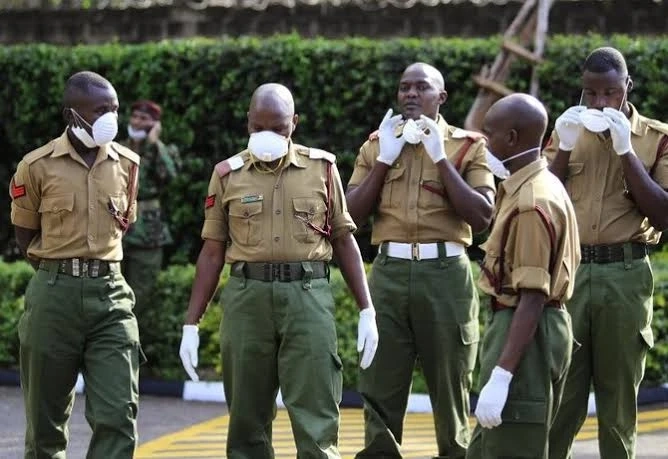Kenya Police recruitment is a demanding process requiring both mental acuity and exceptional physical fitness. Aspiring candidates must demonstrate their ability to handle physically challenging tasks. Therefore, focusing on building physical fitness is crucial for success during the recruitment process.
Importance of Physical Fitness
Physical fitness is essential for police officers to perform their duties effectively. It ensures they can handle the physical demands of law enforcement, such as pursuing suspects, managing stressful situations, and enduring long hours on duty. Good physical fitness reduces the risk of injuries, improves overall health, and enhances stamina, enabling officers to carry out their responsibilities efficiently and safely.
Key Components of Physical Fitness
Cardiovascular endurance is crucial for sustaining prolonged physical activity, vital during foot pursuits or any activity requiring sustained effort. Muscular strength and endurance are necessary for tasks such as restraining suspects or lifting heavy objects, while flexibility reduces the risk of injury and improves the range of motion, allowing officers to maneuver more effectively. Agility and coordination are essential for responding to dynamic situations efficiently, and maintaining a healthy body weight and composition is important for overall fitness and professional appearance.
Fitness Assessment in Recruitment
During the recruitment process, candidates undergo physical fitness tests designed to assess their capabilities. These typically include running, to evaluate cardiovascular endurance, push-ups to measure upper body strength, sit-ups to assess core strength, and agility tests such as shuttle runs to evaluate speed and coordination. Each of these elements is crucial, as they reflect the physical demands officers will face in their day-to-day duties.
Developing a Balanced Workout Plan
Creating a well-rounded workout plan that incorporates all aspects of fitness is essential for aspiring recruits. A comprehensive routine should focus on cardiovascular workouts, strength training, flexibility exercises, and agility drills. Balancing these elements helps candidates develop the physical resilience necessary for police work.
Cardiovascular Training
Running is a key component of cardiovascular fitness. Incorporating interval training, long-distance runs, and sprints into a workout routine can progressively improve time and distance. Cycling and swimming are excellent low-impact options that build endurance and provide variety, helping prevent workout monotony and reducing the risk of overuse injuries.
Strength Training
Strength training is vital for developing the power needed in various police tasks. Weightlifting exercises such as squats, deadlifts, and bench presses work multiple muscle groups, enhancing overall strength. Bodyweight exercises like push-ups, pull-ups, and planks are also crucial, as they build functional strength and improve endurance without the need for equipment.
Core Strength
A strong core supports overall fitness and stability, making core exercises an integral part of any training program. Sit-ups, Russian twists, and leg raises help build a robust core, contributing to better balance and injury prevention, which are vital in physically demanding situations.
Flexibility and Mobility
Flexibility and mobility are often overlooked but are critical components of fitness. Stretching before and after workouts helps maintain flexibility, reducing the risk of injuries. Practices like yoga and Pilates enhance flexibility, balance, and core strength, contributing to a well-rounded fitness regimen.
Agility and Speed
Agility and speed are essential for quick and effective responses in the field. Ladder drills improve foot speed and coordination, while cone drills enhance quick changes in direction and overall agility. These exercises help candidates react swiftly and accurately in various scenarios.
Nutrition and Hydration
Proper nutrition and hydration are foundational to any fitness program. A balanced diet rich in proteins, carbohydrates, and healthy fats fuels workouts and aids recovery. Staying hydrated before, during, and after exercise is crucial for maintaining energy levels and ensuring optimal performance.
Mental Preparation
Mental resilience is as important as physical fitness. Developing a positive mindset, setting realistic goals, and maintaining discipline in training are essential for success. Mental preparation involves visualizing success, staying motivated, and overcoming obstacles with determination and focus.
Rest and Recovery
Rest and recovery are critical components of any fitness program. Adequate rest ensures the body can repair and strengthen itself, preventing burnout and injury. Incorporating rest days and ensuring sufficient sleep enhances performance and supports long-term fitness goals.
Monitoring Progress
Tracking progress is essential for staying motivated and making necessary adjustments to training plans. Keeping a fitness journal helps record workouts, improvements, and any challenges faced, providing valuable insights and encouraging continued growth.
Joining Fitness Groups
Training with others can provide motivation, accountability, and a support system. Joining fitness groups or working out with fellow candidates can enhance the training experience, fostering camaraderie and shared commitment to achieving fitness goals.
Conclusion
Preparing for Kenya Police recruitment requires dedication and a comprehensive fitness plan. By focusing on all aspects of physical fitness and maintaining a disciplined approach to training, candidates can enhance their chances of success. The journey to becoming a police officer is not just about passing tests but also about building a foundation for a healthy and active career in law enforcement. Embracing this holistic approach to fitness ensures that recruits are well-prepared to meet the challenges and demands of their future roles.


